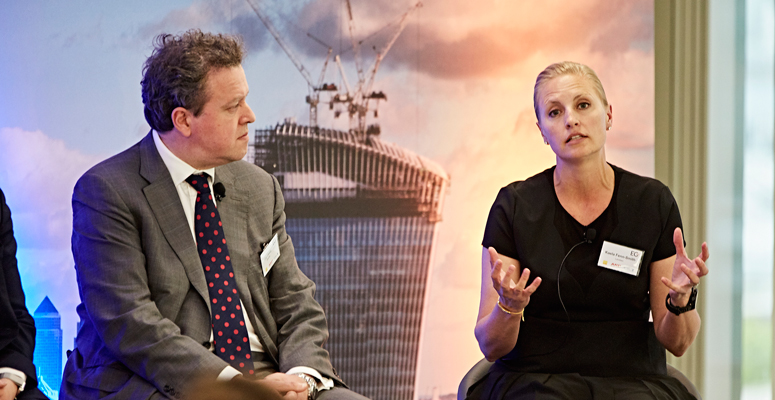Business requirements are changing fast but are developers keeping up?
“Real estate is now a boardroom topic for banks – it wasn’t 10 years ago,” Deutsche Bank managing director for corporate services Kathryn Harrison told an audience at EG’s London Question Time last night.
Flexibility for staff who need to be able to work anywhere was important, she said, but large office space is still a necessity.
The bank has made commitments to more than 1m sq ft in the past two years and in all of those cases they have been 15-year leases.
Most recently, it agreed terms to prelet Landsec’s 500,000 sq ft offices scheme at 21 Moorfields, EC2, on a 25-year lease.
However, she said developers could learn a lot from the services provided by US coworking group WeWork, which now occupies nearly 2m sq ft of offices in London.
ABP’s chief operating officer John Miu, who is overseeing the development of 3.5m sq ft of offices at Royal Albert Dock, said around half will be flexible serviced offices and half will be traditional office floorplates of 15,000-20,000 sq ft.
Landlords including British Land and Brockton Capital are starting to move into the serviced office sector, launching their own serviced office providers for their buildings.
However, Mat Oakley, head of commercial research at Savills, is sceptical about the strength of occupier demand for flexible leases.
“Everyone always says: ‘We want more flexibility’ then a remarkable number of tenants go out and sign 10-year leases,” he said.
He is also doubtful of the longevity of the coworking boom. “I think coworking is a bit of a bandwagon,” he said.
Kaela Fenn-Smith, Landsec’s head of commercial, said developers face the challenge of predicting the future from recent cycles.
“I don’t think the future will be a replica of the past so that’s a challenge for all developers right now,” she said. “What does the next five years look like?”
One of the challenges is dealing with “obsolescence” in buildings caused by technological advances, added Fenn-Smith.
“Going forward, I think technology has the potential to change how we build and it probably needs to because the construction timeline is so slow compared to the way everything’s changed.”
How can London tackle its affordable housing crisis? Former Wandsworth council cabinet member for housing Paul Ellis believes shared ownership could be the answer.
He said: “I think there is a future in shared ownership and things like Pocket Living (which is building an 89-home scheme in Southside, SW18, for first-time buyers living or working locally for at least 20% below market rate).”
Wandsworth has 20,000 homes for social rent in the borough and a rising number of private renters. However Ellis thinks the “vast majority” of those would like to own their own homes.
But Savills’ Oakley disagrees. “One of the fundamental problems with our economy is our obsession with home ownership,” he said.
Addressing the problem is key to the future of the capital’s competitiveness for attracting businesses.
Deutsche Bank’s Harrison says affordable housing provision was one of the bank’s top priorities when selecting offices because research shows the millennial generation wants to be able to afford to live close to where it works.
Pictures: ©Tom Campbell
To send feedback, e-mail Louisa.Clarence-Smith@egi.co.uk or tweet @LouisaClarence or @estatesgazette






















